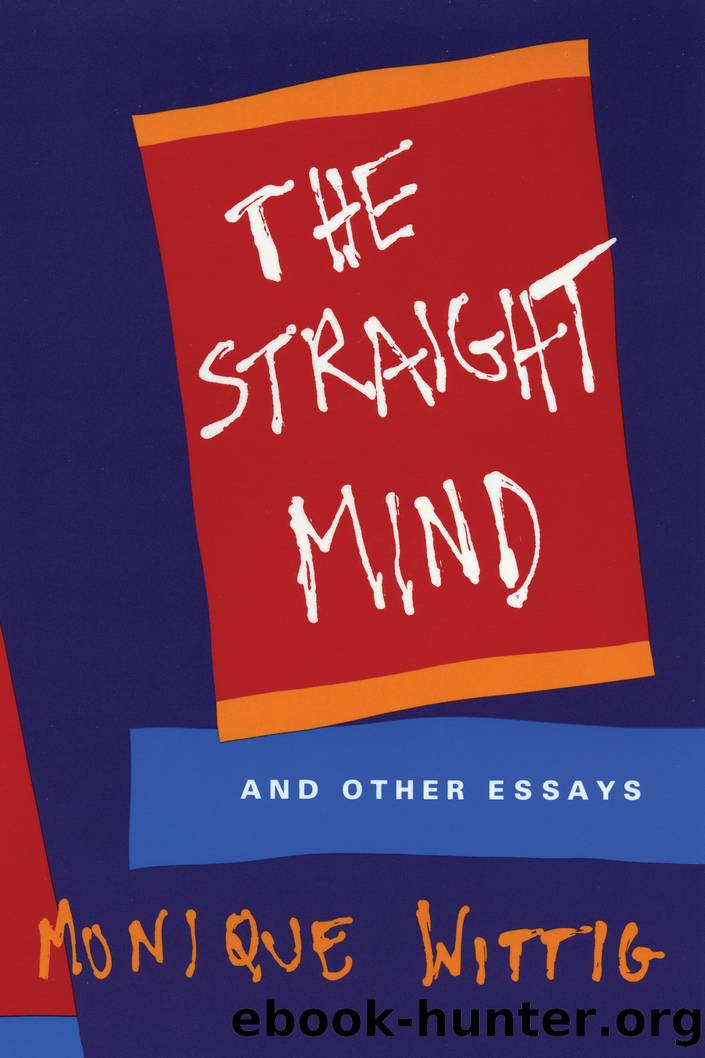The Straight Mind by Monique Wittig

Author:Monique Wittig [Wittig, Monique]
Language: eng
Format: epub
Publisher: Beacon Press
Published: 2020-10-15T00:00:00+00:00
Limited Unlimited
Odd Even
One Many
Right Left
Male Female
Rest Motion
Straight Curved
Light Dark
Good Bad
Square Oblong
We may observe that
right left
male female
light dark
good bad
are terms of judgment and evaluation, ethical concepts, that are foreign to the series from which I extracted them. The first series is a technical, instrumental series corresponding to a division needed by the tool for which it was created (a kind of carpenterâs square called a gnomon). Since Pythagoras and the members of his school were mathematicians, one can comprehend their series. The second series is heterogeneous to the first one. So it so happens that as soon as the precious conceptual tools resting on division (variations, comparisons, differences) were created, they were immediately (or almost immediately by the successors of the school of Pythagoras) turned into a means of creating metaphysical and moral differentiation in Being.
There is then with Aristotle a displacement, a jump in the comprehension of these concepts, which he used for his historical approach to philosophy and what he called metaphysics. From being practical concepts they became abstract ones. From terms whose function had been to sort out, to classify, to make measurement possible (in itself a work of genius) they were translated into a metaphysical dimension, and pretty soon they got totally dissociated from their context. Furthermore, the evaluative and ethical terms (right, male, light, good) of the tabulation of opposites, as used within the metaphysical interpretation of Aristotle (and Plato), modified the meaning of technical terms like âOne.â Everything that was âgoodâ belonged to the series of the One (as Being). Everything that was âmanyâ (different) belonged to the series of the âbad,â assimilated to nonbeing, to unrest, to everything that questions what is good. Thus we left the domain of deduction to enter the domain of interpretation.
In the dialectical field created by Plato and Aristotle we find a series of oppositions inspired by the first mathematical tabulation, but distorted. Thus under the series of the âOneâ (the absolute being nondivided, divinity itself) we have âmaleâ (and âlightâ) that were from then on never dislodged from their dominant position. Under the other series appear the unrestful: the common people, the females, the âslaves of the poor,â the âdarkâ (barbarians who cannot distinguish between slaves and women), all reduced to the parameter of non-Being. For Being is being good, male, straight, one, in other words, godlike, while non-Being is being anything else (many), female: it means discord, unrest, dark, and bad. (See Aristotleâs Politics.)
Plato played with the terms One and the Same (as being God and the Good) and the Other (which is not the same as God which is non-Being, bad). Thus dialectics operates on a series of oppositions that basically have a metaphysical connotation: Being or non-Being. From our point of view, Hegel, in his dialectics of master versus slave, does not proceed very differently. Marx himself, although trying to historicize the oppositions into conflicts (social ones, practical ones), was a prisoner of the metaphysical series, of the dialectical series. Bourgeoisie is on the side of the One, of Being; Proletariat is on the side of the Other, the non-Being.
Download
This site does not store any files on its server. We only index and link to content provided by other sites. Please contact the content providers to delete copyright contents if any and email us, we'll remove relevant links or contents immediately.
The Fine Print (Dreamland Billionaires Book 1) by Lauren Asher(2548)
Fury of Magnus by Graham McNeill(2438)
The Last House on Needless Street by Catriona Ward(2382)
The Rose Code by Kate Quinn(2192)
A Little Life: A Novel by Hanya Yanagihara(2102)
Malibu Rising by Taylor Jenkins Reid(1903)
The God of the Woods by Liz Moore(1902)
Luster by Raven Leilani(1894)
Transcendent Kingdom by Yaa Gyasi(1851)
Moonflower Murders by Anthony Horowitz(1842)
The Lost Book of the White (The Eldest Curses) by Cassandra Clare & Wesley Chu(1683)
This Changes Everything by Unknown(1499)
The Midwife Murders by James Patterson & Richard Dilallo(1476)
The New Wilderness by Diane Cook(1438)
The Lying Life of Adults by Elena Ferrante(1425)
Wandering in Strange Lands by Morgan Jerkins(1410)
Written in the Stars by Alexandria Bellefleur(1391)
Ambition and Desire: The Dangerous Life of Josephine Bonaparte by Kate Williams(1380)
The Lying Life of Adults by Elena Ferrante;(1303)
